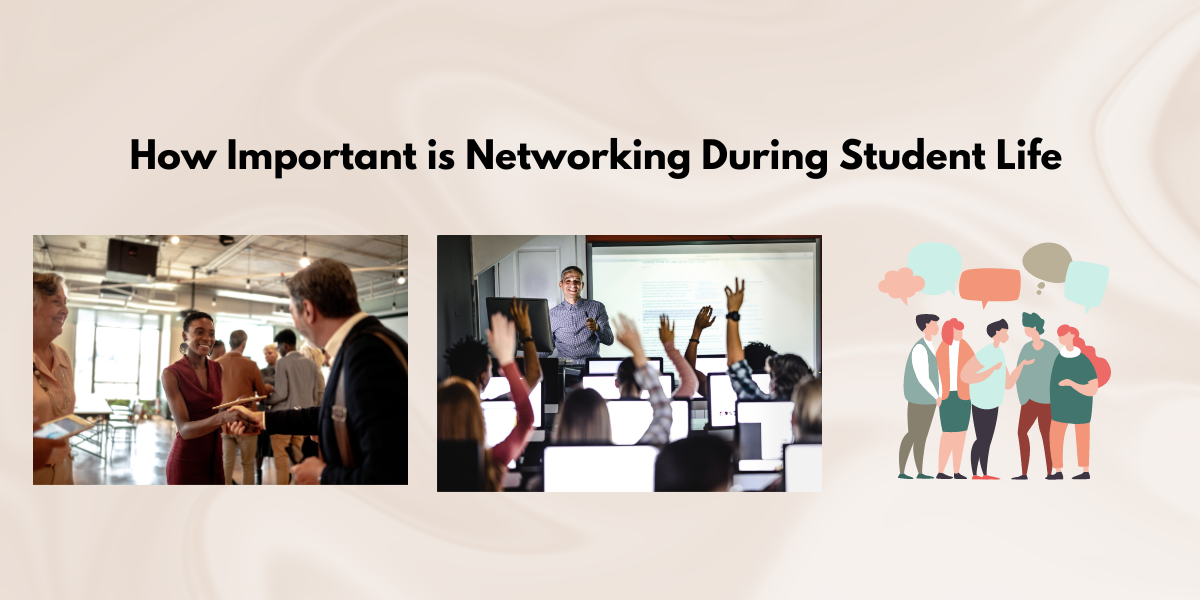How Important is Networking During Student Life?
Introduction
Networking during student life is one of the most vital skills you can develop, yet many students overlook it. Building connections early can open doors to career opportunities, internships, and even lifelong friendships. So, how important is networking during student life? In this post, we’ll dive into the various advantages, disadvantages, challenges, and strategies you should know to make the most of your student network.
Why Networking Matters in Student Life
Once you start your journey in college or university, the way you interact with others can greatly shape both your school material and your future job path. Here’s the complete picture:
Emotional Back-up – Having friends and people who guide you can make the sometimes-tough school feeling a lot easier to successfully deal with. Career Climbing – Getting to know people who are already doing what you dream of can lead you to excellent internships, wisdom-filled mentorships, and even your first serious job.
Knowledge Boost – discussing with classmates, teachers, and those already becoming very well-known in your field opens the doors to knowledge you can’t get just by hitting the books.
Advantages of Networking
Finding the Hidden Gems – speaking and connecting with the right people might help you find jobs, internships, or scholarships that aren’t hitting the major job boards. Often, it’s only concerned with who you know.
Leveling Up Skills – Becoming skilled at discussing, understanding others, and keeping your relationships smooth are just as key as knowing your material; these are the things that can really make an employer notice you. Creating Your Peers – It’s not only about the business cards. Making genuine friendships means you have people to convene with, get advice from, and back you up when times are tough.
Disadvantages of Networking
The Time Crunch – Trying to handle classes, homework, your friends, and then trying to chat can be a lot. It gets even harder if making small talk isn’t your thing.
Facing the No’s – Not everyone is going to be planning to link up. Getting ignored or turned down might make you feel discouraged now and then.
Don’t Simply Name Drop – If you’re only concerned with who you know and forget to award intelligent and informed work, it’s a major mistake. Without keeping yourself sharp, only name-dropping your contacts can leave you stuck when it matters. All in all, the path to discovery and discernment, via networking, depends on how you choose to abide: by giving your time and effort to blending the right mix of knowledge, connections, and personal development.
Challenges and Concerns in Student Networking
Getting Brave to Talk to New Friends
It’s really hard for a large amount of students to go up to someone they don’t know and start speaking, especially for those who are extremely shy. But, to get a wonderful group of contacts, you must beat that fear. Having trouble getting comfortable with a short resume?
Several students worry because they think they don’t have enough experience to share, and that can be stressful. The most important thing to remember is it’s clearly focused on making real friends and not just thinking about what each person can do for the other. Finding Time for Both Online and In-Person Visits: Because there are sites out there like LinkedIn, some people might find it easier speaking online–but remember—those real-life meetings matter too.
And you may thus possibly conclude, it’s extremely important to keep both online and real-life networking in check if you want to have friends and contacts always.
What You Should Do
Starting from scratch, you must begin the friend-making engine as soon as you hit the school grounds. Don’t wait until it feels too late. Making legitimate connections is key. Don’t go fishing for what people can offer you right out the gate. If someone really amazing crosses your path, send them a message or an email to keep talking.
By all means, getting yourself out there in items such as career fairs, guest talks, and reunion types of get-togethers is a wise move. There’s a ridiculous chance to miss out on making friends and useful links if you skip this type of situation. I’m just suggesting–but maintaining a great online persona and diving into things related to what you’re studying is also extremely essential.
What Not to Do
Alternatively, it’s not good to just think about what you can take from new individuals. You’ve genuinely got to puzzle over how you can help them, too. If you’re reaching out and get snubbed, don’t worry about it. It’s part of the drill, just clean it and keep your eyes open for the next opportunity.
Perhaps of note, simply let it slide if someone isn’t planning to mesh with you and concentrate on connecting with people who are. Ignoring this might seriously squander shots at good friendships and hookups in the scene.
Network Advice for Your School Years
Faqs
1.When’s a good time to start building a web of connections at school?
Ideally, begin in your freshman year; the earlier you start, the stronger your connections will be when you finally toss your cap at graduation.
2.How can I keep the bond strong with people I’ve met?
A simple email or message now and then does the trick.Sharing news or articles that catch your eye or asking about their projects keeps the conversation alive.After I get my diploma,
3.can having a solid network really help me get a job?
Absolutely. A significant quotient of jobs get snatched up through someone giving a point out or an insider tip, which could come from your circle.
4.What if I’m more of a wallflower?
Can I still be good at this networking issue? Absolutely, no need to be the life of the party. Zero in on making a few–but very genuine, connections. Small gatherings and online follow-ups are your best bet.
5.Is using the internet as good as meeting people in person for networking?
Both have their perks.Virtual connections keep the conversation going–but convening in person is where you usually make the deeper ties. Sometimes, yet rarely so, online can almost match up to it but it’s pretty tough to beat real-life meetings.
My advice
Join a club or two, go to some events, and don’t hesitate to speak to your teachers or people working in your dream job. It’s extremely important to stay true with the people you meet; trying to get advice or some assistance is okay. You must start doing this early on, so it feels less strange later.
Also, every person you meet could teach you something marvelous, and that is good.
I unsurprisingly find that making friends and helpful contacts while you’re still at school is an important move for setting up a spectacular career.Jobs, internships, and finding people willing to guide you can all come from just speaking to the right people. I get it, walking up to someone new can make your stomach feel funny, especially if you’re somewhat shy–but what you can gain is so much more than the awkward components. Start with a little thing, keep doing it, and make sure you’re focused on those real connections that keep going even after you include your graduation cap in the air.
Conclusion
Getting your network approach on point during your school days? Important step for a happy future. Whether it’s jobs you won’t find posted anywhere, internships that boost your experience, or great teachers to guide you, starting now can get you there. I know doing this material can seem very scary if you’re on the shy side–but in universal reality, the good wins over the scary.Begin things even if it’s just a little at a time, keep at it, and keep in mind it’s primarily focused on the friendship and trust that’ll last far past the day you graduate.n







